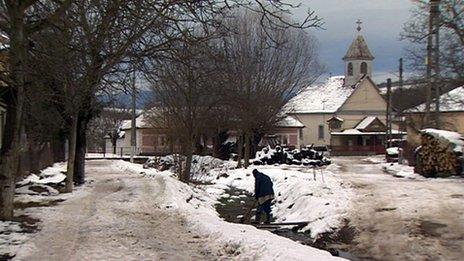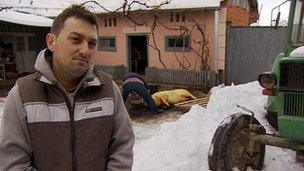Romanians' mixed feelings over working abroad
- Published

From the end of 2013, Bulgarians and Romanians will be free to work across the European Union. These countries have substantial populations - about 27 million in all. Many in Britain worry that there will be a new influx of migrants, particularly from Romania, but observers within the country are more sanguine.
Dr Mircea Kivu, a sociologist and commentator in Bucharest, doubts many will head for the UK.
He believes that anyone who wanted to emigrate has left already: "I think the big wave already happened," he told me. "Now there will be waves, but not a tsunami."

Cristian Cabau spent five years working in Spain before moving back to Romania
Over the past decade millions of Romanians have gone to work abroad.
Most went to Spain and Italy, partly because those languages are close to Romanian, partly because Spain waived restrictions, initially keen to welcome new workers for its construction boom.
In the village of Nimaesti, in the foothills of the Carpathian mountains, deep in Transylvania, most families used to have at least one member working in Spain: some even moved there permanently for a time.
In the small yard of a single-storey village house I met Cristian Cabau. He had spent five years working in Spain and saved enough to build his own house.
He had trained as an assistant pharmacist, though in Spain he had done mostly unskilled work. Cristian had found a job in a pharmacy in a nearby town, and he told me that he planned to stay in Romania for now.

Radu Serb says his wife's work abroad helps to supplement their pension
Walking through the small village of Fizis, a few miles away, I was hailed by Radu Serb, a pensioner with a house on the main street.
He was living on his own, he told me, because his wife was in Italy, caring for an elderly lady.
She spends half the year there and earns 600-700 euro (£490 to £570; $870 to $1,000) a month - four times the value of their monthly Romanian pension. The money would help pay for their daughter's wedding.
Returning home
Dr Alina Branda has studied migration patterns from Nimaesti and Fizis.
She told me that villagers tended to go to the same place in Spain and had helped one another find jobs and homes.
Almost all returned to Transylvania, using money saved to build houses or start businesses.

Dr Alina Branda says younger Romanians are more open to travelling to different countries for work
It was "circulatory" migration - typical of many areas of rural Romania. However the crisis in the eurozone meant far fewer were working there now.
With Dr Branda, I met a group of younger villagers: including teenagers who had spent much of their adolescence in Spain. Their attitudes differed from their parents, whose lives she had studied. They were more adventurous.
Geanina and Madelin Nistor had spent years at school in Saragossa, because their father had run his own construction business there, and they wanted to go back.
Emil Serb, a bricklayer in his 30s, had worked in Spain - for many times the daily rate he could get in rural Romania. He was keen to work in other European countries too.
None of the villagers had realised that restrictions would be eased at the end of the year.
Not all of them wanted to go.
Adrian Budau, aged 18, had spent time in Spain when his parents worked there. He had not liked it. "I want to stay here, in my country," he told me.
That was a view shared by a group of successful young professionals I met in a bar in central Bucharest.
They had good jobs, most in the thriving software sector: they worked for international companies.
While they said the political and economic climate in Romania needed to improve, they wanted to stay.
Sabina Catinean described how she had recently travelled to Scotland. Buying a ticket for a tour bus, she said, the cashier had been very surprised to learn she was Romanian.
Brandy sales
"But you speak such good English," the cashier said. "We are not a poor, poor country, with no education," said Sabina.
When Polish migrants came to Britain their favourite drinks followed.
Now Zubrowka - bison grass vodka - and Zywiec beer are easy to find in British cities.
One Romanian company is hoping to profit in a similar fashion from Romanian migration to the UK.
Stelios Sava is the commercial director of Alexandrion, a very popular brandy, produced in Ploesti, 100km (60 miles) north of Bucharest.
He said that sales in Britain were rising, as more Romanians arrived. "The number is increasing. Very much," he told me.
He is confident that sales will continue to grow, as more Romanians move.
In 2004, when Poland joined the European Union, Poles were only allowed to work in the UK, Ireland and Sweden - and Poland is one of the larger European states, with 40 million people. The British government had estimated relatively few Poles would come - hundreds of thousands did.
For the Romanians, it will be different - they will be able to work freely across the entire European Union. But this time the British government is making no predictions.
Watch Sanchia Berg's full report at the BBC Newsnight website or on BBC iPlayer.